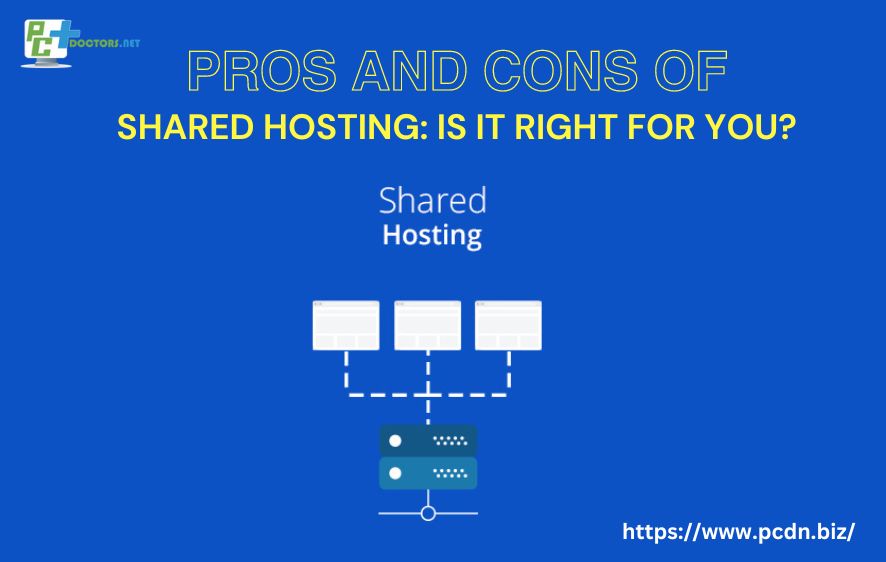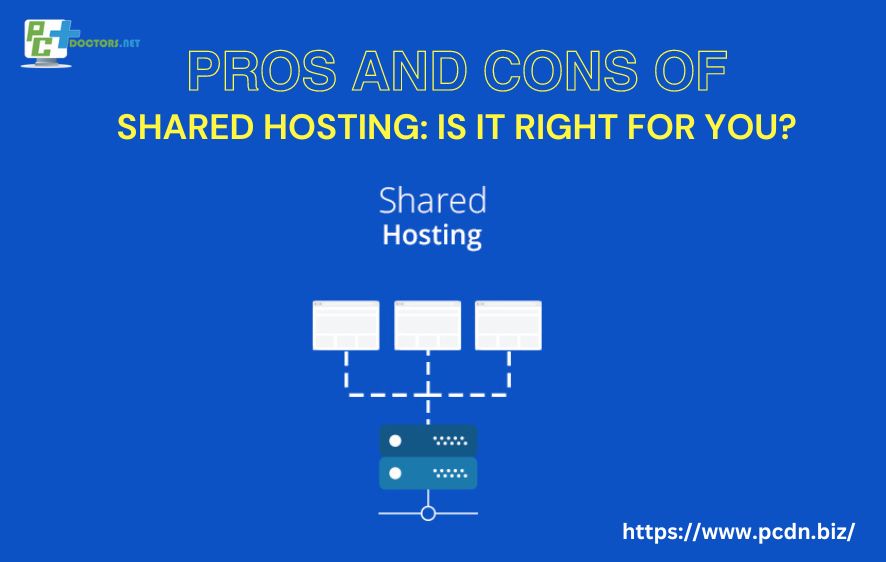Pros and Cons of Shared Hosting: Is it Right for You?
Introduction:
In the ever-expanding digital landscape, choosing the right hosting solution for your website is crucial. Shared hosting is a popular option for many, offering a cost-effective and beginner-friendly approach. However, like any hosting solution, it comes with its own set of advantages and disadvantages. In this article, we’ll explore the pros and cons of shared hosting to help you decide if it’s the right fit for your online presence.
What is shared hosting?
Shared hosting is a web hosting service where multiple websites are hosted on a single physical server and share its resources, such as CPU, RAM, and disk space. Each website on the server has its own separate account, but they all utilize the same server infrastructure. This hosting option is cost-effective and suitable for small to medium-sized websites with moderate traffic, as it allows users to share the expenses of server maintenance. However, the shared nature of resources can lead to potential performance issues if one website experiences high traffic or consumes excessive resources.
How does shared hosting work?
Shared hosting involves multiple websites sharing resources on a single server. Each website has its own space and resources, such as storage, bandwidth, and processing power, but these are distributed among all the hosted sites. This cost-effective hosting solution is suitable for small to medium-sized websites with moderate traffic. However, since resources are shared, the performance of one website can be affected by the activities of others on the same server. It is an ideal option for individuals and businesses with budget constraints and basic hosting needs, as it provides a convenient and affordable way to get a website online without the complexities of managing a dedicated server.
Pros:
Cost-Effective: Shared hosting is budget-friendly, making it an ideal choice for those who are just starting their online journey. The costs are distributed among multiple users sharing the same server, resulting in lower monthly fees compared to other hosting options.
Ease of Use: Shared hosting providers typically offer user-friendly interfaces and control panels, making it easy for beginners to manage their websites. Most hosting companies also provide one-click installations for popular CMS platforms, further simplifying the setup process.
Maintenance and Security: Server maintenance and security are handled by the hosting provider, allowing users to focus on creating and managing their websites. Regular updates, patches, and security measures are implemented at the server level, reducing the technical burden on users.
Scalability: Shared hosting plans often come with the option to scale up as your website grows. This allows you to start small and upgrade your hosting plan as your traffic and resource needs increase.
Cons:
Resource Limitations: The shared nature of the hosting environment means that resources such as CPU, RAM, and bandwidth are shared among multiple users. During periods of high traffic or resource usage, your website may experience slowdowns or performance issues.
Limited Customization: Shared hosting plans come with limitations on server configurations and software installations. This can be a drawback for advanced users or those with specific technical requirements.
Security Concerns: While hosting providers implement security measures, the shared environment makes it more vulnerable to security risks. If one website on the server is compromised, it can potentially affect others as well.
Less Control: Users have limited control over server settings and configurations, as these are managed by the hosting provider. This lack of control can be a drawback for users who require more flexibility and customization options.
What should you look for in shared hosting?
1-Performance:
Look for hosting plans with sufficient resources (CPU, RAM, storage) to handle your website’s needs. Consider factors like server location and the provider’s use of caching and content delivery networks (CDNs) to enhance speed.
2-Scalability:
Choose a hosting plan that allows for easy scalability, enabling your website to handle increased traffic and resource demands as your business grows.
3-Reliability and Uptime:
Ensure that the hosting provider has a strong track record of reliability and offers high uptime guarantees (ideally 99.9% or higher).
Who should use shared hosting?
1-Budget-Conscious Individuals/Small Businesses:
Shared hosting is generally more affordable compared to other hosting options, making it suitable for individuals, bloggers, or small businesses with limited budgets.
2-Low to Moderate Website Traffic:
Shared hosting is suitable for websites with moderate traffic levels. If your website is just starting out or doesn’t expect heavy traffic, shared hosting can handle the load efficiently.
3-Managed Hosting Preferences:
Those who prefer a hands-off approach to server management may find shared hosting appealing, as it typically includes server maintenance and support from the hosting provider.
Is Shared Hosting Right for You?
If you’re a small business owner, blogger, or just starting your online journey, shared hosting can be an excellent choice. It provides a cost-effective solution with user-friendly features.
To experience reliable shared hosting services, consider partnering with a trusted provider like PC Doctors.NET. With a commitment to delivering top-notch hosting solutions, PC Doctors.NET offers robust shared hosting plans tailored to meet your specific needs.
Conclusion:
In conclusion, shared hosting is a cost-effective and user-friendly option for individuals and small businesses entering the online space. Shared hosting has its pros and cons, and its suitability depends on your unique requirements. Evaluate your website’s needs and choose a hosting solution that aligns with your goals, keeping in mind the reliable services offered by PC Doctors.NET. Give us a call at +1 (346) 355-6002 (USA) / 1800-889-0674 (IND) / +44 (208) 089-3489 (UK).

